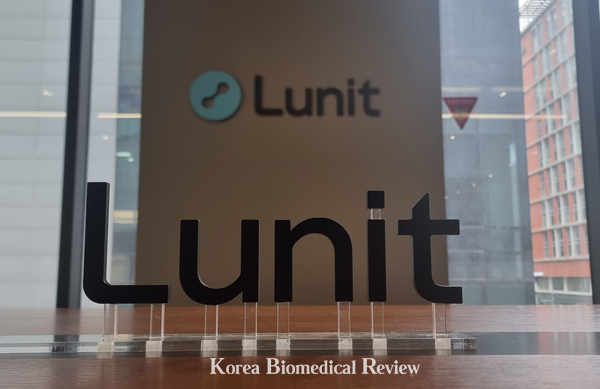Lunit, a Korean medical AI company, saw its shares surge on Monday following the announcement of a strategic partnership with global pharmaceutical giant AstraZeneca to develop AI-based digital pathology solutions for non-small cell lung cancer (NSCLC).

As of 10:00 a.m. on Monday, Lunit's shares were trading at 58,700 won ($42.20), up 21.78 percent from Friday.
This marks the first direct agreement between Lunit and a global pharma giant since the launch of its AI biomarker platform, Lunit SCOPE, in early 2023. The collaboration will leverage Lunit’s Genotype Predictor, an AI-powered pathology analysis solution developed earlier this year, to predict epidermal growth factor receptor (EGFR) mutations in NSCLC using only H&E-stained slide images.
Traditional EGFR mutation testing requires costly and time-consuming molecular diagnostics, such as next-generation sequencing (NGS) or polymerase chain reaction (PCR). These methods often face limitations, including false-negative results and reliance on substantial tissue samples.
Lunit's solution can predict EGFR mutation likelihood within five minutes and detect rare cancer cells even in small tissue samples, offering a quicker and more accurate diagnostic process.
By integrating Lunit’s AI solution into AstraZeneca’s pathology workflow, the partnership aims to enhance clinical applications of AI technology, expedite optimal treatment decisions, and expand patient eligibility for EGFR-targeted therapies. The companies also plan to outline detailed plans for global sales expansion and broader collaboration next year.
“This partnership reflects AstraZeneca’s commitment to advancing precision medicine in oncology,” AstraZeneca's Head of Global Oncology Diagnostics Kristina Rodnikova said. “AI-powered solutions like Lunit’s have the potential to optimize diagnostic workflows and improve treatment outcomes for NSCLC patients.”
Lunit CEO Suh Beom-suk also said, “This agreement signifies Lunit’s meaningful first step in aligning with a global big pharma company for cancer treatment.”
The company anticipates significant improvements in outcomes for lung cancer patients, the leading cause of cancer deaths worldwide, Suh added.
Related articles
- Lunit partners with France's largest private medical imaging network to provide AI mammography
- [SITC 2024] MD Anderson study shows Lunit SCOPE IO platform could transform immunotherapy selection
- Lunit’s subsidiary Volpara signs $7.3 million deal with US DHA for breast cancer screening software
- Lunit AI predicts breast cancer risk up to 6 years ahead
- Lunit to release 20 AI diagnostics studies at RSNA2024
- Lunit to supply AI medical imaging solutions to Mexico via Salud Digna's network
- Lunit's AI-backed chest X-ray cuts emergency triage time by 77%: study
- Lunit partners with SITC to provide AI biomarker platform to global researchers
- AstraZeneca rolls out AI lung scan bus in Korea to catch cancers missed by CT

